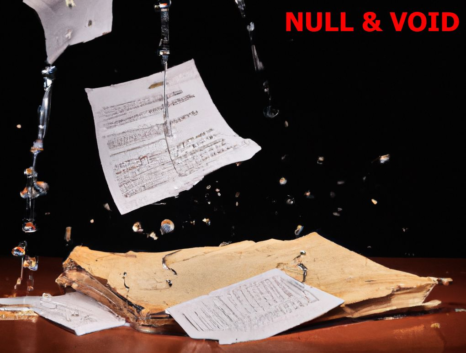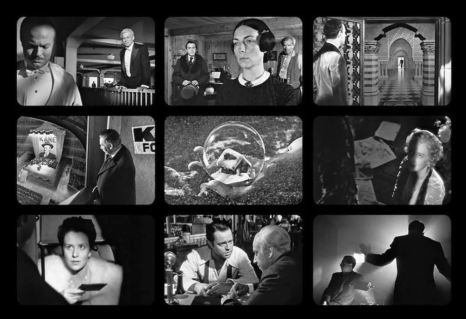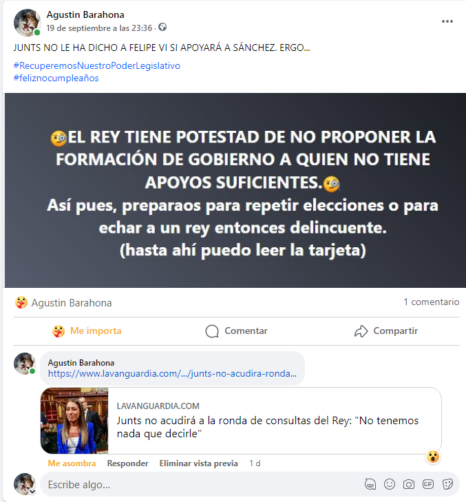Escritos publicados en la red social Facebook.
Categoría: Escritos en Facebook

(Español)
«En la España actual, circulan mitos y fábulas que muy a menudo pasamos por alto. Algunos de estos mitos se relacionan con la supuesta legitimidad de la Constitución española y la democracia representativa. Sin embargo, al analizar las normas internacionales, la historia y el propio razonamiento lógico, surgen preguntas. Las principales son si esta Constitución realmente tiene plena legitimidad y si la representatividad existe.
Insisto. Este par de claros ejemplos de falacias legales y sociales están en:
1.- la propia supuesta legitimidad de la Constitución española que, en la realidad, sin embargo, teniendo en cuenta las normas internacionales e históricas en las que se instituyó y, sobre todo, la propia lógica, sería una norma nula de pleno derecho a ese respecto.
2.- la propia supuesta representatividad ciudadana del sistema de partidos, así como que el ciudadano pueda controlar los poderes del estado a través de éstos.
Como siempre, no voy a pedir que me crean. Prefiero exponer algunos de los hechos concretos que, con el tiempo, me llevaron a esta convicción basada en evidencia sólida.
Hace muchos años hice también un artículo en otro medio analizando las raíces históricas de todo esto. Pero para no alargar demasiado este artículo antes de la encuesta, partiré del principio fundamental de la Revolución Francesa y Americana. Es decir, los tres poderes del Estado, legislativo, ejecutivo y judicial, deben estar al servicio del pueblo. Y es al pueblo a quien corresponde por Derecho el Poder Legislativo. Pertenece a quien va a sufrir su propio trabajo, garantizando así que lo hará por ello lo mejor posible.
MEOLLO
Para que dicho poder se ejerza correctamente, antes de que llegarse al texto constitucional ha de haber un periodo constituyente. Un tiempo en el que el propio pueblo español, disfrutando de libertad colectiva, se establezca como colectivo constituyente. Todo para definir cómo quiere la ciudadanía que sea esa norma constitutiva de su propio Derecho Fundador.
Para que una norma sea «constitución» hace falta que cumpla con unos requisitos básicos: no cualquier cosa es una «constitución». Requisitos que las constituciones europeas históricas por excelencia, posteriores a dichas revoluciones francesa y americana, respetaban. Son básicos siempre porque son garantes de la estabilidad y tranquilidad que se deriva de la lógica de la legitimidad.
Uno de los más elementales y básicos que son conditio sine qua non es la división de poderes. Es decir, división de poderes que se constituyen intervigilantes del cumplimiento constitucional entre ellos. Y algo que se sigue y deriva inmediata y concomitante de ello es el control desde Poder Legislativo. Tiene que poder fiscalizar y vigilar que los poderes ejecutivo y judicial cumplen su trabajo tal como el legislativo definió.
Esto es en extremo importante. Uno de los principios de la democracia llamada representativa es que los ciudadanos puedan ser representados real, eficaz y efectivamente por el o los diputados que ellos decidan libremente. Y a la vez se ha de garantizar en cada representante que lo que los ciudadanos determinan es llevado a la cámara y tenido en cuenta eficientemente según la ley.
Y si el diputado o grupo de diputados comisionados para esa labor de representación no la realizan o la realizan defectuosamente son despedidos automáticamente al día siguiente de demostrarse, sin esperar a ningún otro plazo. Todo ello con el fin de ejercer ese poder de control que necesariamente tiene que tener el poder legislativo. Poder que ha de constituirlo la ciudadanía para que pueda haber una democracia.
Originalmente se instituyó la representatividad aduciendo que no cabían todos en el edificio donde se deciden las cosas públicas del país. Actualmente esto es falso, porque hay medios técnicos que pueden garantizar dicha participación colectiva e incluso colegiada sin necesidad de estar todos físicamente en una misma sala. Pero eso sería tema de otro artículo.
En suma, es decir, sin este mecanismo de control del poder legislativo, y también ultérrima y originalmente de los ciudadanos constituyentes, no hay ni puede existir democracia y mucho menos democracia representativa.
FINAL
Pues bien, tengamos en cuenta que
1.- desde el punto de vista de la legitimidad constituyente, lo que tenemos es una constitución nula de pleno derecho. Y, en el mejor caso, una especie de ley orgánica pergeñada y pertrechada directamente en época del anterior dictador. Una norma puesta en marcha por los poderes fácticos desde el sistema franquista. Activados para evitar que pudiera haber el imprescindible periodo constituyente realizado por quienes lo detentamos, el pueblo español. De todos es sabido que Franco no quería que los españoles le chafáramos los planes pudiendo elegir por nosotros mismos. Y se aducía que como no teníamos experiencia éramos como niños a los que había que cuidar.
Y tengamos también en cuenta que
2.- de lo anteriormente explicado, no existe ni puede existir democracia ni democracia representativa en el sistema. Un sistema instituído desde la propia ley franquista sin periodo constituyente real. No podemos elegir libremente qué persona o personas físicas queremos que nos representen. Esto es evidente. Vienen pre-dadas y depredadas en un pack prefijado que establece el jefe del partido que sea, que es quien elige nuestros representantes, no nosotros. Representantes que ni nos representan ni pueden representarnos porque las normas de los partidos a los que se deben se lo impiden. Y no podemos por ello garantizar la obligatoria e imprescindible independencia de poderes.
ENCUESTA
Así pues, solicito desde este humilde blog que alguien me explique de un modo demostrativo, con hechos,
1.- cómo podemos, en el presente y real estado de cosas, controlar y fiscalizar en todos los sentidos a los poderes del estado para poder hacer que el funcionamiento de nuestra democracia al menos parezca constitucional. Recuérdese que no existe en la mal llamada constitución ninguna norma que permita que los españoles tomen decisiones sobre su futuro. Porque el articulo 92 es potestad del presidente del gobierno. Y la iniciativa legislativa popular es controlada por el gobierno con la propaganda gubernamental. Y con la posibilidad de veto total del presidente del gobierno, tal como reza en la mal llamada constitución.
2.- o cómo podemos salir eficiente y pacíficamente de este secuestro patente con apariencia falsa de legalidad en el que nos encontramos desde hace más de 40 años. Y así iniciar un periodo constituyente de verdad que, al menos, nos encamine a una verdadera y entonces existente democracia.
Las respuestas en los comentarios. Muchas gracias de antemano.»
[Agustín Barahona]
(English)
In contemporary Spain, myths and fables often circulate unnoticed. Some of these myths are related to the alleged legitimacy of the Spanish Constitution and representative democracy. However, when we analyze international norms, history, and logical reasoning, questions arise. The main ones being whether this Constitution truly possesses full legitimacy and whether representativeness exists.
I emphasize this. These two clear examples of legal and social fallacies are as follows:
1.- The supposed legitimacy of the Spanish Constitution, in reality, considering international and historical norms, and above all, logic, would be null and void in this regard.
2.- The supposed citizen representativeness of the party system, as well as the citizen’s ability to control the state’s powers through them.
As always, I won’t ask you to believe me. I prefer to present some concrete facts that, over time, led me to this conviction based on solid evidence.
Many years ago, I also wrote an article in another publication, analyzing the historical roots of all this. But to keep this article from becoming too long before the survey, I will start with the fundamental principle of the French and American Revolutions. That is, the three branches of government—legislative, executive, and judicial—must serve the people. It is the people who have the rightful claim to the Legislative Power. It belongs to those who will directly bear the consequences of their work, thus ensuring they do it to the best of their ability.
CRUX
For this power to be exercised correctly, there must be a constituent period before reaching the constitutional text. A time in which the Spanish people, enjoying collective freedom, establish themselves as a constituent body. All of this to define how the citizenry wants its constitutive norm of its foundational rights to be.
For a norm to be a «constitution,» it must meet some basic requirements: not just anything can be a «constitution.» These requirements were fundamentally respected by the historic European constitutions, following the French and American revolutions. They are basic because they guarantee the stability and tranquility derived from the logic of legitimacy.
One of the most elementary and basic ones, a conditio sine qua non, is the separation of powers. That is, the division of powers that serve as mutual overseers of constitutional compliance among them. And something that follows directly and concomitantly from this is the control from the Legislative Power. It must be able to oversee and monitor that the executive and judicial powers perform their duties as defined by the legislature.
This is extremely important. One of the principles of representative democracy is that the nation’s people, its citizens, can be genuinely, effectively, and efficiently represented by the freely chosen deputies. And at the same time, it must be ensured that what citizens decide is taken to the chamber and efficiently considered according to the law. If the deputy or group of deputies appointed for this representation fail to perform or perform it defectively, they are automatically dismissed the day after it is proven, without waiting for any other deadline. All of this is to exercise the necessary control power that the Legislative Power must have. A power that must be established by the citizenry for there to be democracy.
Originally, representativeness was established, arguing that not everyone could fit in the building where public matters of the country are decided. Currently, this is false because there are technical means that can guarantee such collective and even collegiate participation without everyone needing to be physically present in the same room. But that would be the subject of another article.
In summary, that is, without this mechanism of control over the Legislative Power, and also ultimately and originally of the constituent citizens, there is no and cannot be democracy, much less representative democracy.
FINAL
Well, let’s consider that:
1.- From the perspective of constituent legitimacy, what we have is not really a constitution. It would be null and void. At best, it’s a kind of organic law devised and equipped directly during the era of the former dictator. A norm set in motion by the actual powers from the Francoist system. Activated to prevent the essential constituent period from being carried out by those of us who hold it, the Spanish people. It is widely known that Franco did not want us Spaniards to thwart his plans by choosing for ourselves. It was argued that, as we lacked experience, we were like children who needed to be taken care of.
And let’s also consider that:
2.- Based on what has been explained earlier, there is neither democracy nor representative democracy in the system. It’s a system established by the Francoist law itself without a real constituent period. We cannot freely choose which person or individuals we want to represent us. This is evident. They come predetermined and preselected as a pre-packaged deal set by the party leader, who is the one choosing our representatives, not us. Representatives who neither represent us nor can they represent us because the party rules they adhere to prevent them. As a result, we cannot guarantee the mandatory and essential separation of powers.
SURVEY
So, I request from this humble blog that someone explains demonstratively, with facts:
1.- How can we, in the current state of affairs, control and oversee the state powers in every sense to make the functioning of our democracy at least appear constitutional? Recall that there is no provision in the so-called constitution that allows Spaniards to make decisions about their future. This is because Article 92 is within the purview of the President of the Government. And popular legislative initiative is controlled by the government through governmental propaganda. Plus, it has the potential for total veto by the President of the Government, as stated in the so-called constitution.
2.- Or how can we efficiently and peacefully break free from this blatant and falsely legal hostage situation we’ve been in for over 40 years? Then initiate a real constituent period that, at the very least, sets us on a path toward a genuine and existing democracy.
The answers in the comments. Thank you very much in advance.»
[Agustín Barahona]

(Español)
«No hace falta entrar aquí siquiera en la cuestión del ADN que ya hemos tocado otras veces. En la naturaleza entera tenemos ante nosotros la secuencia de cambios de varias especies completas. Dicha secuencia contiene prácticamente todos los momentos significativos de su desarrollo evolutivo. Y, a pesar de dichas evidencias, los creacionistas y seguidores de la religión del diseño inteligente lo niegan. Sostienen que tales fragmentos de todo un proceso no lo son realmente. Su pseudoargumento es que dicen que no pueden ver cómo cualquiera de ellos «se convierte» en el siguiente.
Todo ello a pesar de que, para cualquier persona inteligente, es evidente que se trata de algo lógico y contrastable. Una historia resultante de los cambios que una especie ha sufrido generando otras y manteniendo o no la troncal común. Incluso aunque el todo, la totalidad de dicha secuencia diacrónica, queda arqueológica y paleontológicamente ante nuestros ojos como un hecho incontrovertible.
Lo que ellos vienen a aducir es que cada una de esas fases del proceso ha sido en realidad creada simultáneamente a todas las demás. Y que la apariencia vinculante que las relaciona es sólo un principio de economía de medios del propio creador.
¡Vivir para ver!
Es decir, que, como tampoco podemos ver las transiciones entre fotogramas de una película, por exactamente los mismos pseudoargumentos que usan habitualmente los creacionistas/diseñointeligentistas, no existirían las películas de cine. Para ellos el rollo material de la película no es más que una serie de fotos que alguien hizo simultáneamente y que puso ahí para que disfrutáramos del album de fotos, una a una, negando la evidencia de su propia secuencia diacrónica constituyendo una película.»
[Agustín Barahona]
(English)
«There is no need to even enter the question of ADN that we have already touched on other times. In the entire nature, we have before us the sequence of changes of several complete species. This sequence practically contains all the significant moments of their evolutionary development. And, despite these evidences, creationists and followers of the intelligent design religion deny it. They argue that such fragments of an entire process are not really so. Their pseudo-argument is that they say they cannot see how any of them “becomes” the next.
All this despite the fact that, for any intelligent person, it is evident that it is something logical and contrastable. A story resulting from the changes that a species has undergone, generating others and maintaining or not the common trunk. Even though the whole, the totality of this diachronic sequence, remains archaeological and paleontologically an incontrovertible fact before our eyes.
What they argue is that each of these phases of the process has actually been created simultaneously with the others. And that the binding appearance that relates them is only a principle of economy of means of the creator himself.
Live to see!
That is, just as we cannot see the transitions between frames of a film, by exactly the same pseudo-arguments that creationists/intelligent designers commonly use, there would be no movies. For them, the material roll of the film is nothing more than a series of photos. Snapshots that someone took simultaneously and put there for us to enjoy the photo album, one by one. So denying the evidence of its own diachronic sequence constituting a movie.»
[Agustín Barahona]
